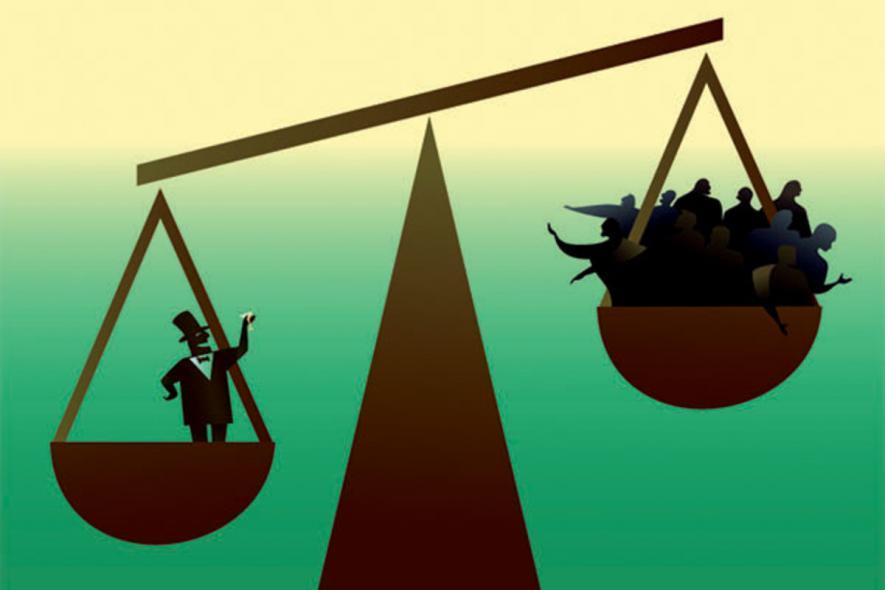World Needs Popular Mobilisations to Tackle Pandemic-Induced Inequality

Oxfam released two reports on inequity on 17 January that measure the economic impact of the Covid-19 pandemic. The evidence available from across the world is that the gulf between the rich and the poor has widened. Oxfam also released “Inequality Kills, India Supplement 2022”. It finds that both the number of billionaires and their collective wealth has ballooned in the country.
In 2021, the number of billionaires rose from 102 to 142. The top decile in the country owns 45% of its wealth, while the bottom 50% owns 6%. The 98 richest billionaires own as much wealth (US$657 billion) as the bottom 40%, numbering 555 million. The richest 100 own assets worth US$775 billion.
This happened while 84% of households suffered a decline in earnings and more than 120 million jobs were lost, with unemployment going up to 15%. According to the Food and Agriculture Organization, there are over 200 million undernourished people in India.
The Oxfam report, ‘Inequality Kills: The Unparalleled Action Needed to Combat Unprecedented Inequality in the Wake of Covid, shows us is a running sore in global society and political economy, including in India. What we can anticipate, in the absence of something truly monumental, is that inequality is going to get worse and the conditions under which the world’s poor live, especially in the Global South, will get worse.
Alongside, we saw something else over the Covid-19 pandemic. Especially in North America and West Europe, an ‘epiphany’ seemed to have been inspired by the pandemic—that societies were unsustainably inegalitarian and that the poor did not have the resources to cope, especially during the pandemic. It was demonstrable that ethnic minorities and poor communities were being harder hit by the virus in north America and West Europe.
And there seemed to be a response in the Global North, accompanied by much overblown rhetoric. Thus, in the last few months of his term, then United States President Donald Trump signed into being trillion-plus dollars to support students, the unemployed and small businesses. This was after years of tax breaks for the super-rich and cuts in federal funding for practically all agencies providing or monitoring public goods.
In the United Kingdom, too, Prime Minister Boris Johnson and Chancellor of the Exchequer Rishi Sunak, much against form, were compelled to massively increase funding for the social services and small businesses. This was after a whole decade of Tory austerity, involving swingeing cuts in social services and higher education.
That wasn’t all. The Tory establishment in the United Kingdom and the incoming Democratic establishment led by current United States President Joe Biden went further in promising that the future course of economic policy would be premised on big spending for infrastructure and social services—public goods in other words.
The United Kingdom rebuilding project was sold with the slogan ‘Levelling Up’, as one which would address the questions of inequality and the construction of physical, public infrastructure. In the United States, Biden promised a multi-trillion plan to build public infrastructure, address the issues of poverty and inequality and, critically, climate change, by promoting a greener economy—the slogan was ‘Build Back Better’.
These “revolutions” are now in tatters. In the United States, two Democratic Senators, Joe Manchin and Kyrsten Sinema, have torpedoed the Bill that would have materialised Biden’s plans in a vertically split Senate, despite Biden and the Democratic establishment’s readiness to compromise.
In the United Kingdom, Johnson’s always unthought-through populism—mostly sloganeering—has run into Sunak’s more conservative fiscal and economic persuasions. Britons look forward to lower taxes for the rich and more of the same: austerity.
Before we get into this report more, we should mention one problem—combating Covid-19 itself. In the initial years, the World Health Organization had led a chorus of appeals urging the need to ensure that, globally, people got an equitable share of vaccines at affordable prices. That was not just an ethical issue but would have been enlightened self-interested as well.
It has not happened. While developed countries have stockpiled vaccines, the poorest parts of the world have little access to them. In all of the African continent, for example, under 15% of the population have received at least one dose of a vaccine. Latin America and the Asia Pacific region have done reasonably well, vaccinating 72% of the people with at least one dose, while North America is slightly ahead with 76% and Europe behind them, with 66%. West Asia is at 51%. Obviously, there are big disparities within regions. In all, 1.7 crore people have died from the virus. In some countries, people from the poorest sections are four times more likely to die than the richest.
To get to the Oxfam report, despite all the rhetoric and bumped-up spending, we are shown that while the wealth of the world’s 10 richest men has doubled, that of 99% of people has declined. The report tells us that during the pandemic a new billionaire has been created every 26 hours, while 160 million people “are projected to have been pushed into poverty”.
The inequality is between countries as much as within them. For the first time in a generation, the gap between rich and poor nations is expected to grow. At least, 73 countries face austerity measures mandated by the International Monetary Fund, which will likely worsen disparities between and within countries.
The wealth of the “small elite of 2,755 billionaires” has increased more during the pandemic than in the past 14 years. What has enabled this is not a deus ex machina, but skyrocketing stock prices (in a globally recessionary period), a surge in monopoly power aided by more privatisation, cuts to corporate tax rates, loosening of regulations and the assault on workers’ rights accompanied by a fall in wages.
Long before the pandemic, economists like Thomas Piketty had exposed the growing inequalities that prised upon North American and some West European societies since the 1980s. Piketty, particularly, showed that by the end of the last century, inequality had begun to approach the levels of the nineteenth century and the early years of the twentieth century. It was only after World War I and, especially, World War II that societies started to become more economically equal, with states in the North adopting dirigiste roles.
But practically everywhere in the world now, “small government” is the rage. When in India, Prime Minister Narendra Modi came to power, he was quick to promise minimum government and maximum governance. What we got, though, is inept, corrupt government and pathologically clueless governance.
Nevertheless, the point is that small governance is an ideological slogan that means governing for the rich against the poor, using weapons that range from tax cuts for the rich to assisting corporate union-busting activities.
It may well make sense to take stock. Writing about the 1990s, Naomi Klein charted the beginning and evolution of the branding revolution, which fundamentally involved a divestment from production by corporate behemoths of the Global North. She also wrote optimistically about a growing global anti-corporate movement, facilitated by the internet.
In the West, the promise of that movement was briefly revived after the 2008 recession in the ‘Occupy’ movement. Closer home, we have had two seminal citizen-led movements; one against the Citizenship (Amendment) Act, 2019, and the farmers’ movement.
We must hope that such movements will help fashion a progressive agenda, because periodic elections will not.
The author is an independent journalist and researcher. The views are personal.
Get the latest reports & analysis with people's perspective on Protests, movements & deep analytical videos, discussions of the current affairs in your Telegram app. Subscribe to NewsClick's Telegram channel & get Real-Time updates on stories, as they get published on our website.
























